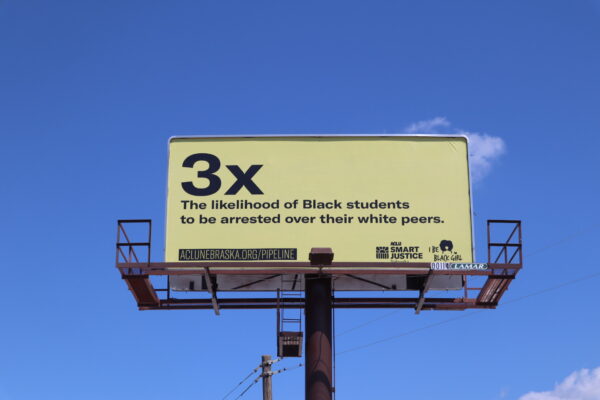In Nebraska, students of color are far more likely to be disciplined, suspended, or expelled than their white peers. Police interactions in schools also show clear racial divides.
- Black students are 3 times more likely than white students to be arrested.
- Hispanic/Latinx students are 1.4 times more likely than white students to be arrested.
- Native American students are 2.5 times more likely than white students to be arrested.
The data and disparities are clear. Students of color disproportionately have a different school experience than their white peers. It is time to close that gap.
What is the school-to-prison pipeline?
The school-to-prison pipeline funnels children from our schools’ classrooms into the juvenile and criminal justice system when typical behavioral issues are criminalized. For example, in Nebraska, we’ve found situations where police treated an elementary school student taking candy from a teacher’s desk as theft and two brothers yelling at each other as a “disturbance or suspicious occurrence.”
The harm doesn’t fall equally. As shown in our report “From the Classroom to the Courtroom,” Nebraska’s students of color, most significantly Black students, and students with disabilities are significantly overrepresented in school law enforcement referrals. In an effort to combat these alarming disparities, the ACLU passed one of the best SRO regulation bills in the country, establishing language and guidelines that ensure SROs fit within the larger educational mission of public schools and to improve safety, not to discipline or punish students. LB390 requires that Nebraska schools that do employ school police must implement training and program requirements to protect both students’ civil rights and parents’ rights. Passing LB 390 was an important first step, but we must do more to protect our students and ensure they have a safe educational environment.
What drives the school-to-prison pipeline?
Inadequate resources in public schools, the enforcement of unforgiving zero-tolerance policies, and an increased presence of police in schools, often labeled School Resource Officers (SROs).
How can we end the school-to-prison pipeline?
Invest in our children’s futures, not incarceration.
How Your Local School Board, City Council and County Boards Can Help
When schools prioritize punishment, students of color are pushed out of schools and into the criminal legal system. Too many schools are wrongly investing in keeping officers patrolling the hallways rather than spending already limited resources on counselors, mental health support, and other services that could enrich students’ lives while preparing them for the future.
City council and county boards decide how to make sometimes generational funding decisions. You have the power to hold those who decide your child’s future accountable. Contact your local representatives and let them know they need to invest in children, community, and families.
Nebraska State Legislature
State budget decisions also play a critical role towards ensuring we invest in smart justice programs and our communities. Growth in state spending on our prison systems has outpaced overall budget growth and priority spending areas, like education, for the last 20 years. Our state senators have the ability to choose a better path and they can do so by rejecting plans to build a new $270 million prison.
Learn more about the new prison plan.
Instead of incarcerating Nebraska’s children, we should be educating them and using increased resources to focus on keeping them in school, keeping them engaged and keeping them on track for a future of opportunity, joy, and abundance.
Equity in education is one of the goals in the ACLU, Black and Pink and I Be Black Girl Guide to Fighting Racism in Nebraska. Learn more about local opportunities to dismantle systemic racism.

